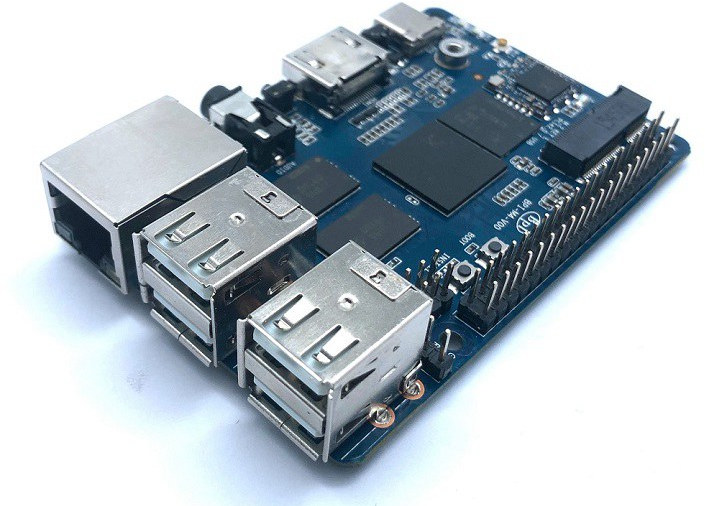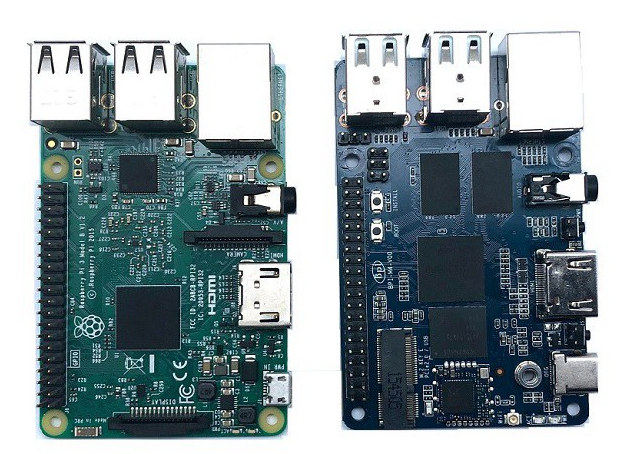Banana Pi BPI-M4 was unveiled at the beginning of the year as an alternative to Raspberry Pi 3B+ with the same form factor, but equipped with a more capable processor, namely Realtek RTD1395 with support for 4K video output and decoding, Gigabit Ethernet support, PCIe, etc..
SinoVoIP has however made the choice not to go with Gigabit Ethernet, and opted for a cheaper design with Fast Ethernet instead. Having said that, the 4K capabilities of the processor, and PCIe via an M.2 socket are still leveraged in the company’s latest Banana Pi board. What’s changed is that Banana Pi BPI-M4 is now available on Aliexpress for $38 plus shipping in 1GB RAM + 8GB flash storage configuration.
 Banana Pi BPI-M4 specifications have not changed:
Banana Pi BPI-M4 specifications have not changed:
- SoC – Realtek RTD1395 quad-core Arm Cortex-A53 processor with Mali-470 MP4 GPU
- System Memory – 1 GB DDR4 (option 2 GB)
- Storage – 8G eMMC flash (max 64 GB), micro SD slot up to 256GB
- Video Output – 1x HDMI 2.0b port up to 4K @ 60 Hz
- Video
- Decode – 4K2K 60fps H.265 and VP9, 4K2K 30 fps H.264, 1080p (Full HD) of MPEG1/2/4/H.264 MVC, AVC/VC-1, VP8, VP9, AVS, AVS Plus, HD JPEG, etc.
- Encode – 1080p (Full HD) H.264
- Audio – Via HDMI port, 3.5mm audio jack
- Connectivity – 100 Mbps Ethernet and 802.11 b/g/n/ac WiFi 5 + Bluetooth 4.2 (via RTL8821 module) with u.FL antenna connector
- USB – 4x USB 2.0 host ports, 1x USB 2.0 type C port
- Expansion
- M.2 Key E slot with PCIe 2.0 and USB 2.0
- 40-pin Raspberry Pi compatible GPIO header with up to 28 GPIO, UART, I2C, SPI, PWM and power signals (5V, 3.3V, GND)
- Misc – Boot selection switch; power and activity LEDs; Power, Reset, Uboot and Install push buttons
- Debugging – 3-pin debug UART header for serial console access
- Power Supply – 5V/2A via USB type-C port or PoE using the official Raspberry Pi PoE HAT.
- Dimensions – 92x60mm; Note: Raspberry Pi 3B+ measures 85 x 56 mm, but SinoVoIP appears to have included the connectors for their dimensions
- Weight – 48 grams

You should be able to re-use most of Raspberry PI accessories including enclosures and some HAT add-ons board, but software support is uncertain, especially for the PCIe interface used in the M.2 socket. The wiki has some information about hardware, but almost nothing for the software except the board supports Android and Linux, plus some instructions for WiFi and Bluetooth. No firmware image download link, and no source code. It’s unclear whether the board on Aliexpress is pre-loaded with Android or Linux (Ubuntu?), so better wait until they actually update their wiki properly with sources and firmware images before going ahead with a purchase if your board fits your needs.

Jean-Luc started CNX Software in 2010 as a part-time endeavor, before quitting his job as a software engineering manager, and starting to write daily news, and reviews full time later in 2011.
Support CNX Software! Donate via cryptocurrencies, become a Patron on Patreon, or purchase goods on Amazon or Aliexpress. We also use affiliate links in articles to earn commissions if you make a purchase after clicking on those links.




not too bad board ..hope the kernel support follows ….
So you’re not this ‘admin’ over there, right? https://www.cnx-software.com/2019/02/13/banana-pi-bpi-m4-rtd1395-board-raspberry-pi/#comment-560653
BTW: ‘not too bad’ for what exactly? What’s the use case for a hardware almost as crippled as a Raspberry Pi but lacking software and community support?
not too bad for M.2 slot (with PCIe 2.0)
large and fast SSD storage for NAS solutions
or for experimental daughter boards with PCIe (my case)
> large and fast SSD storage for NAS solutions
Well, it’s key E here so you need an E to M adapter, then it’s just a single Gen2 lane with unknown performance yet (show me fio results as Gouwa did for S922X and I’m happy) while those ‘fast’ SSDs all want Gen3 x4 which is just 8 times faster than what we’ve here.
And why a fast SSD with NAS in mind when the board is limited to Fast Ethernet anyway. We’re talking about less than 100 Mbps at the TCP/IP layer here.
A little bit of information is provided. They ran sbc-bench already. http://ix.io/1Dt1 reveals that
* CPU cores clock up to 1.4 GHz and integer performance is comparable to similar quad core A53
* usable memory is limited to 570MB (GPU reservations?)
* Kernel 4.9.119 is running (same branch as their W2 with RTD1296?)
* thermal throttling is most probably not working yet (SoC temp +100°C)
100C? wtf.
According to sbc-bench output (ix.io/1Dt1) max SoC temp reported is 103.1°C while no throttling happened (the cpuminer scores remain the same over 5 consecutive minutes). As we all know Banana folks never gave a sh*t about proper thermal design of their boards and maybe they lack knowledge to add a few thermal trip points to this (currently it’s supposed to do a hard shutdown at 130°C).
RTD1395 is a cut-down version of the RTD129x family, so that makes sense.
There is a very short video of starting a buggy Android 8.1.1 from Feb 15 2019. BBW as they say.
Run video test
https://www.youtube.com/watch?v=4n8nhaCYa6s&pbjreload=10
That’s Android. Every f*cking TV box SoC on this planet supports HW accelerated video decoding with Android since it’s designed only for this. The only question of interest is Linux driver support since if you want to run Android why choosing an SBC in the first place and not any TV box that is usually cheaper for this very limited use case.
https://github.com/BPI-SINOVOIP/BPI-files/commits/master reveals that they now use a single branch for W2 (RTD1296) and M4 (RTD1395) both using a 4.9 kernel. But conflicting info that W2 is still on 4.4.18 is there at the same time. You’ll also find some ‘M4 boot logs’ there (made with a ‘Realtek QA Board’ with 2GiB RAM).
1GB and 64 bit system- its electronic rubbish. I think they dont issue 32 bit system….
can easy to update to 2GB RAM,just think about cost
This is a joke. The Sinovoip company seems to release each board with a different SoC in order to minimize the software support and fitness of the product for any purpose. How about buying the official RPi instead?
> How about buying the official RPi instead?
How about thinking about use cases first and then trying to find an appropriate device that fits the needs? I use this approach to successfully avoid both the ‘official RPi’ as well as those lame clones not adding something significantly to a copy of board size and connector positions.
Voted that one up with the following remark:
(1) For people regularly reading this blog: probably none.
(2) Otherwise:
– Learning tool for the kiddies from 7 to 77 years old,
– Discovering the world of SBCs (as I did 6 months ago),
– Play electronics with all these add-ons and sensors (oh my I think I fried that one),
– Discovering soldering, what AWG means, what I = V / R means, finally use that multimeter bought years ago, learn the gospel about uart, i2c, spi, pwm and so on.
– Stepping stone to Odroid, RK3999, etc and learn that U-boot is not necessarily a submarine.
🙂
“that U-boot is not necessarily a submarine.”
That deserves an up-vote.
They are using SoCs from families so the code base is mostly the same across boards. The bigger problem here is they are using a SoC with no/limited vendor upstream support and no/limited community support.
The specs of this seem pretty close to the rpi3 and the price is basically the same so I think for once you actually have a point. As long as you assume that everyone that would consider this want something that is basically a cheaper version of the rpi3 and aren’t looking for something the rpi3 doesn’t have like pci-e.
Realtek vs rpi? Here I’m for once with Jerry
For once I’d agree you have a point here. I mean, this board looks as crappy as an RPi in every aspect (CPU performance, network performance, mainline support since on RPi linux is just threadX’s puppet). If I want to buy something to fill my trash, better buy the original. Well at least this one does provide storage, which the RPi doesn’t have. This doesn’t justify the price IMHO.
This board in this price tag and software support is only another expensive paperweight.
Why we need another boards like this? ( They not even know howto measure board dimensions. )
I can change my mid but I wanna see H264 transcode working.
I am not interested in M.2 connector because there is only 100M network onboard. ( The designer of the board is not from this planet I believe. )